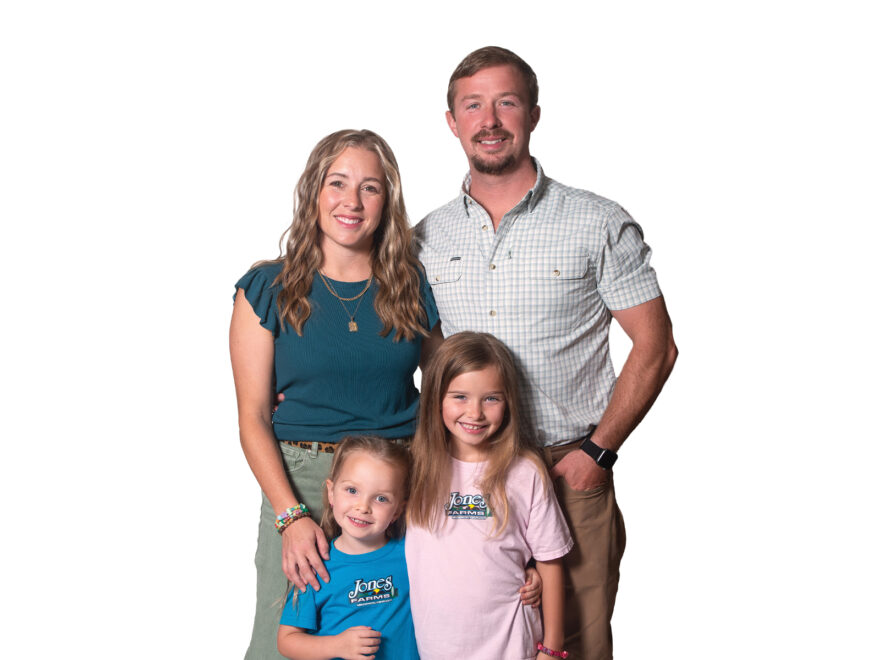
Photo by Darrin Phegley
Tell us a little about yourself (family, pets, etc.)
We have two daughters, Reagan Grace (6) and Elsie Lee (4). We have a dog named Belew, a rabbit named Steve and two hermit crabs named Rockstar and Diamond.
What do you both do for a living and how long have you been in those roles?
Clate is a part of his family owned seed company called Kentucky Blue Corn. They specialize in breeding unique corn genetics that are grown for food products such as corn chips, tortillas, color dyes and bourbon. Mindy is Product Agronomist for Pioneer seeds. She works with the lifecycle management of corn, soybeans, wheat and canola for Kentucky and Tennessee. Mindy manages on-farm research trials across the state to bring new products to market. Shes been with Pioneer for 12 years. We also own Jones Farms, operating out of Henderson and McLean counties. We work closely with Mindy’s parents’ operation, Hopson Farms, predominately growing food grade corn and soybeans.
What do you love most about farming? What are some of the challenges you face?
We love watching plants grow. There is just something fulfilling about putting a seed in the ground and doing everything you can to help it reach its full potential. The most challenging aspect of farming are the parts you cannot control. High input prices, extreme weather challenges such as delayed planting from too much rain, river flooding to the crops burning up from not enough rain. Farming involves a lot of risk management and most importantly, faith.
When you aren’t working on the farm, what hobbies do you and your family enjoy? When we are not working, we are usually hunting or running the kids to a sporting event or practice. The girls both play soccer, gymnastics and love to swim. The whole family hunts. Anyone close to Mindy knows her happy place is in a deer stand, and Clates is either duck or turkey hunting. Clate got to share his passion for turkey hunting with Reagan this year, and she killed her first turkey during youth season.
How do you balance work and family life?
To be honest, it’s hard to say there is much balance. With our jobs and farm operation from spring until winter, it’s pretty much always busy season for one of us. We try to spend as much time together as a family that we can. We make vacations a priority so we can get away and enjoy quality time together. Also, we couldn’t do it without the help of both of our mothers. They are the unsung heroes of keeping the operations running.
What is involved in corn breeding and growing specialty corn?
Corn breeding is a process of developing new corn hybrids for specific reasons. It involves selecting plants with desirable traits such as high yield, or in our case, color for food products. It’s a long process. It takes up to eight generations to create a finished inbred that can be crossed to make a hybrid. Growing commercial production of specialty corn has its own set of challenges but for the most part not all that different from conventional corn. It will be non-GMO so that requires a more expensive and specific herbicide plan. The corn also needs to be isolated from conventional fields so there is no cross pollination. The most important part of specialty corn is ensuring you have a good market for your crop. You need a contract with an end user offering a price that makes it all worth your time.
What advice would you give someone interested in a farming career?
As Randy Hopson always told me, “Experience is your best teacher.” If you can start working with an operation to gain experience and knowledge, even as a high school student, that is a great way to learn. Access to land and operating capital are the most challenging parts of starting a farming career. It’s important to start building relationships with landowners and local farming operations. You never know where those relationships may lead.
This is my very hard working family that’s dedicated to their job, what would we do without the farmers and their hard work so if you see a tractor taking up most of the road be patient and give them a thumbs up 👍 proud mother and grandma